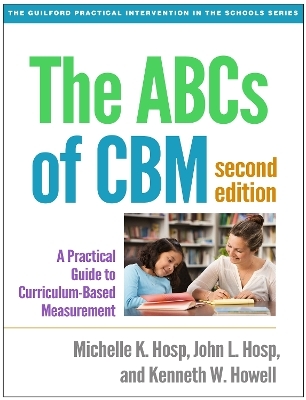
The ABCs of CBM, Second Edition
Guilford Press (Verlag)
978-1-4625-2466-2 (ISBN)
New to This Edition:
*Broader grade range--now has a chapter on secondary content areas.
*Chapter on early numeracy; expanded content on early reading.
*Nearly twice as many reproducible tools, including new or revised administration and scoring guides.
*Key updates on graphing and on using online CBM databases.
This book is in The Guilford Practical Intervention in the Schools Series, edited by Sandra M. Chafouleas.
See also The ABCs of Curriculum-Based Evaluation, by John L. Hosp, Michelle K. Hosp, Kenneth W. Howell, and Randy Allison, which presents an overarching problem-solving model that utilizes CBM.
Michelle K. Hosp, PhD, is Associate Professor of Special Education at the University of Massachusetts Amherst. A nationally known trainer and speaker on problem solving and the use of progress-monitoring data, she has served as Director of the Iowa Reading Research Center and as a trainer with the National Center on Progress Monitoring and the National Center on Response to Intervention, and is currently on the technical review committee for the National Center on Intensive Intervention. Her research focuses on reading and on multi-tiered systems of support/response to intervention (MTSS/RTI) in relation to curriculum-based measurement (CBM) and curriculum-based evaluation (CBE). Dr. Hosp has published numerous articles, book chapters, and books. John L. Hosp, PhD, is Professor of Special Education at the University of Massachusetts Amherst. His research focuses on MTSS/RTI, including disproportionate representation of minority students in special education and aligning assessment and instruction, particularly in the areas of CBM and CBE. Dr. Hosp has conducted workshops nationally and has authored over 50 journal articles, book chapters, and books. Kenneth W. Howell, PhD, is Professor Emeritus of Special Education at Western Washington University. A former general and special education teacher and school psychologist, Dr. Howell’s primary focus has been on students with learning problems and behavioral difficulties, including adjudicated youth. He has presented nationally and internationally on CBE, MTSS/RTI, juvenile corrections, and social skills, and has published extensively in the areas of CBE, CBM, and problem solving.
1. What Is CBM and Why Should I Do It?
2. CBM for Assessment and Problem Solving
3. How to Conduct Early Reading CBM
4. How to Conduct Reading CBM
5. How to Conduct Spelling CBM
6. How to Conduct Writing CBM
7. How to Conduct Early Numeracy CBM
8. How to Conduct Math CBM
9. How to Conduct Content-Area CBM
10. Charting and Graphing Data to Help Make Decisions
11. Planning to Use CBM—and Keeping It Going
Appendix A. Norms for Early Reading CBM, OPR CBM, and Maze CBM
Appendix B. Reproducible Quick Guides and Forms for Conducting CBM
References
Index
| Erscheint lt. Verlag | 27.4.2016 |
|---|---|
| Reihe/Serie | The Guilford Practical Intervention in the Schools Series |
| Verlagsort | New York |
| Sprache | englisch |
| Maße | 203 x 267 mm |
| Gewicht | 1440 g |
| Themenwelt | Geisteswissenschaften ► Psychologie ► Entwicklungspsychologie |
| Geisteswissenschaften ► Psychologie ► Pädagogische Psychologie | |
| Medizin / Pharmazie ► Medizinische Fachgebiete ► Pädiatrie | |
| Medizin / Pharmazie ► Medizinische Fachgebiete ► Psychiatrie / Psychotherapie | |
| Sozialwissenschaften ► Pädagogik ► Sonder-, Heil- und Förderpädagogik | |
| Sozialwissenschaften ► Soziologie | |
| ISBN-10 | 1-4625-2466-4 / 1462524664 |
| ISBN-13 | 978-1-4625-2466-2 / 9781462524662 |
| Zustand | Neuware |
| Haben Sie eine Frage zum Produkt? |
aus dem Bereich


